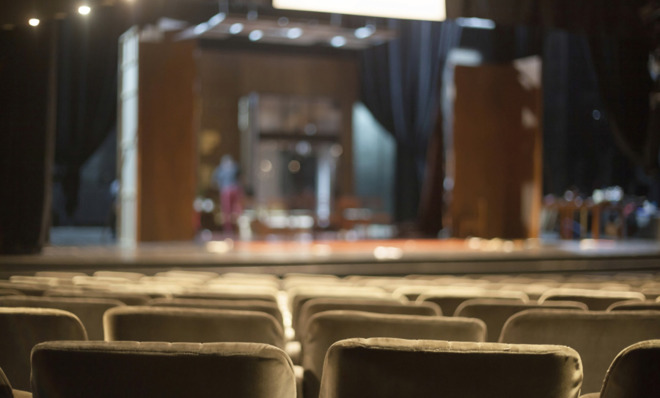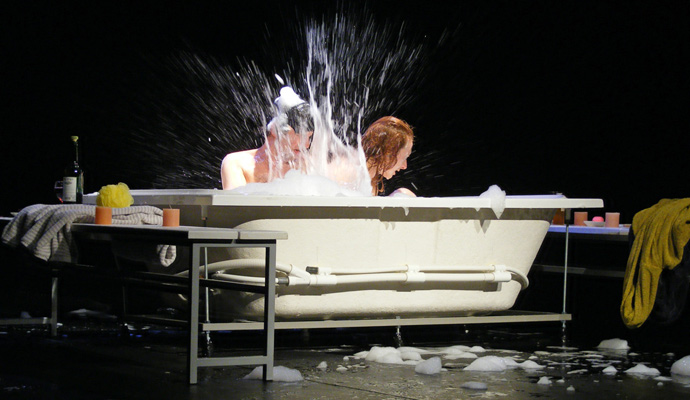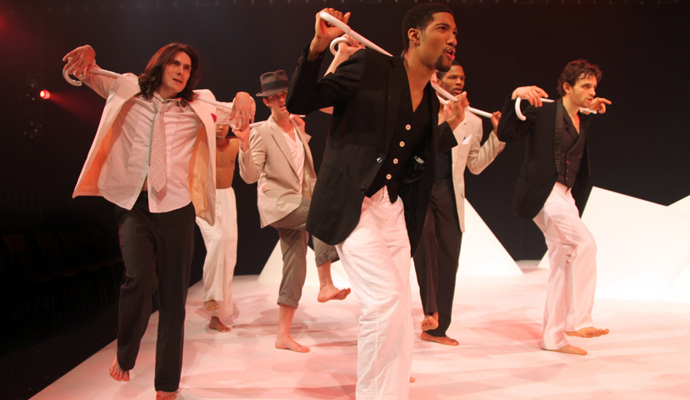What I learned from my frenetic Fringe binge
A seasoned theater professional dives headfirst into the world of mimed masturbation, weapon-wielding clowns, and talking grapes that is the New York International Fringe Festival

A free daily email with the biggest news stories of the day – and the best features from TheWeek.com
You are now subscribed
Your newsletter sign-up was successful

Someone bathing on stage? Commonplace. Two people bathing together on stage? Seen it. Male and female conjoined twins spending almost the complete duration of an hour-long Bulgarian play in bathtub? For that, I needed to go to the Fringe.
Inanimate objects coming to life and talking? Oh, that's so Toy Story. Two grapes discussing life for 80 minutes? Yup, that's the Fringe.
I didn't choose to see these plays. As a Connecticut native, raised on a diet of regional theater, Broadway and the major Off-Broadway companies, I don't usually spend a whole lot of time below Union Square. Coming out of college, my drama club friends became doctors and lawyers, so I was never compelled to see productions in fifth-floor downtown Manhattan lofts. Having only moved here a decade ago at age 40 to run the American Theatre Wing, which required me to see every show that opened on Broadway, I'm pretty mainstream by default. But for three days one August, I dove into the New York International Fringe Festival, letting an unknown person fill my days with the kind of theater I would never have selected for myself. What manner of lunatic am I? Let me explain.
The Week
Escape your echo chamber. Get the facts behind the news, plus analysis from multiple perspectives.

Sign up for The Week's Free Newsletters
From our morning news briefing to a weekly Good News Newsletter, get the best of The Week delivered directly to your inbox.
From our morning news briefing to a weekly Good News Newsletter, get the best of The Week delivered directly to your inbox.
(More from Narratively: My epic comedy of horrors)
As diverse as anyone manages to make their entertainment choices, they are ultimately part of a self-fulfilling plan. Whether it's a play, a movie, a book, or a TV show, our cultural choices are, for the most part, self-curated experiences that align with our existing interests. Only the truly adventurous will opt for an experience about which they know nothing or, even worse, strikes them as unappealing, especially if they have to pay for it. We don't accidentally find ourselves at Mamma Mia! if we hate musicals, or a football game if we loathe sports.
Even though I see perhaps 125 theater productions a year, attend about 50 movies in theaters, and watch far too much television, I'm still not as omnivorous as the casual (or non-) theatergoer might perceive me to be. It may be hard to perceive limitations in the guy who enjoyed Fast and Furious 6 and is also the aesthete who reveled in the eight-hour marathon "Great Gatsby" adaptation Gatz, but I know my biases and where I prefer not to go. In the cultural arena, even if one is an avid consumer (since my teens) and a professional (since the age of 21) all at once, it's easy to block out entire swaths of experience, pop and high culture alike. I wanted to get past that, to see if I could still expand my own repertoire.

Presenting some 185 productions in a span of a little more than two weeks, the New York Fringe, with its youthful irreverence, bare bones and anything-goes ethos, struck me as the perfect petri dish in which to conduct an experiment. Like any mad scientist, I made myself the test subject. What would be the effect of an eclectic, perhaps unpolished, theatrical barrage on the psyche of someone with such an establishment history? What would it be like to be subjected to a highly compressed theatergoing binge without any choice in what I would attend? Other than offering up 72 consecutive hours to Narratively and urging my editor (who I know only by Twitter, email, and a single phone conversation) to pack the schedule so long as I got time to eat, I committed to three days at the Fringe, taking in whatever I was directed to see, informed of my schedule each morning with minimal time to form advance notions. I know that my four or five shows a day for three days pales compared to die-hards who spend a week in Edinburgh taking in six or seven shows daily, but even this more measured pace struck my friends and my wife as going off the deep end. I had no idea what I'd think when I came out the other side.
A free daily email with the biggest news stories of the day – and the best features from TheWeek.com
And I'm off!
Day 1
My assigned agenda was waiting in my email inbox when I awoke the first morning. It felt a bit like I was Jim Phelps (or Ethan Hunt, for the youngsters) on Mission: Impossible, getting my brief to topple a fictional Latin American dictatorship. Having paid no attention to literature about the Fringe in order to avoid preconceptions, I was a bit disappointed when all of the shows for the day turned out to be in theater that I knew (although, in the case of The Players Theatre on MacDougal Street, I'd never been inside). Mild adventure at best.
(More from Narratively: The poetry whores)
My first show, about a would-be celebrity chef whose absurd concoctions had failed to catch the palate of television executives, began at 2 p.m. On a Wednesday. Oh, dear god: I'm a matinee lady. Here I thought I was breaking new ground and I start by making myself a cliché. But once I got over my panic, I noticed that the audience was in fact mostly younger than me — this held true at all but two shows. So even though I was a relatively senior patron, I was, comfortingly, at an experience sought out by those ostensibly hipper than myself, albeit theater geeks like me. I kept waiting for food be thrown into the audience by the increasingly manic chef, wondering whether the front rows might at any moment be showered with diced vegetables, as if at a Gallagher gig. Alas, the premise stayed with self-flagellation for the solo show rather than audience assault.
An hour later, I'm back out into the sunshine. With more than 90 minutes to go until my next show, I check emails, tweet, return a couple of calls. But trying to avoid snacking and not being a coffee drinker, I simply have time to kill. My greatest concern in this first break, which is already longer than my time in the theater so far? Would my phone battery hold out until I get home at midnight? Not unlike the experience of a long wait at an airport, I learn that finding an open power outlet at the Fringe is a beautiful thing.
Next show: a "version" of Gertrude Stein's Four Saints In Three Acts. I'm pretty sure I saw Four Saints once. I lived in Hartford, Connecticut for a decade, where the 1934 premiere of Stein's piece took place, and is still referenced as a cultural touchstone when the city is accused of being straight-laced. That I can't clearly remember the production I saw in Hartford suggests this is going to be a slog.
Within 15 minutes of lights up, I'm grabbing for my program, because this sure isn't anything I remember. This cast looks so young. Who on earth are they? Who put this together? After about four bios I discover a common thread: I'm watching a show featuring undergraduates from Carnegie Mellon University. And while the word's are Gertrude's, these kids developed the almost completely a capella score themselves, under the direction of a CMU grad student. Loath as I am to play critic (and it's not the purpose of my Fringe binge), before it's half over I'm ready to buy the CD (yes, yes, I know — or download it from iTunes).

(More from Narratively: The theater came crashing down)
Dinner. I wolf down a piece of lasagna across the street, then back into the same theater (La Mama) for the next show, then a quick sprint across the Village for the final show of the evening. Of these, one is amateurish but well-meaning, the other cynical and tasteless. The only noteworthy moment? During one of these shows, I see the first instance (of what would eventually become four) of simulated or mimed masturbation. Yes, it will become a mini-motif over three days. I don't realize it right away, but collectively, they add up. Does this say something about the state of our culture? Is the motif a metaphor? Is this being taught in drama schools? I shudder at the possibilities. And I won't even go into the implications of the show in which a character rhetorically asks to be rectally assaulted with an array of increasingly uncomfortable objects.
When I get home I give my wife the briefest of recaps, as she's already in bed and halfway to sleep. I'm feeling a bit down, wondering whether I was taking the work on its own terms, something I always advocate, or holding it to the standard of my more conventional theatergoing fare. Have my perception and taste calcified with age and experience, or did I just see a few misfires? I haven't spent much time in 99-seat, 60-seat, 30-seat theaters. I have to make significant perceptual adjustments for the Fringe, not because I had to make allowances for their constraints, but because I haven't fully learned to appreciate work that may be truly new, extremely youthful, and made with the barest bones.
Read the rest of this story at Narratively.
Narratively is an online magazine devoted to original, in-depth and untold stories. Each week, Narratively explores a different theme and publishes just one story a day. It was one of TIME's 50 Best Websites of 2013.
-
 Political cartoons for February 14
Political cartoons for February 14Cartoons Saturday's political cartoons include a Valentine's grift, Hillary on the hook, and more
-
 Tourangelle-style pork with prunes recipe
Tourangelle-style pork with prunes recipeThe Week Recommends This traditional, rustic dish is a French classic
-
 The Epstein files: glimpses of a deeply disturbing world
The Epstein files: glimpses of a deeply disturbing worldIn the Spotlight Trove of released documents paint a picture of depravity and privilege in which men hold the cards, and women are powerless or peripheral